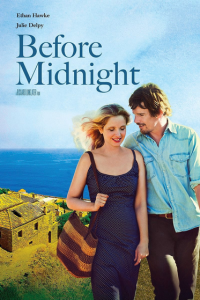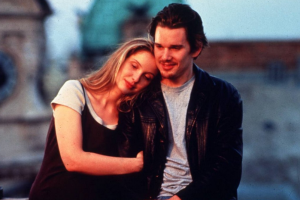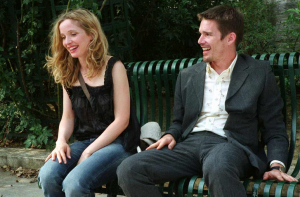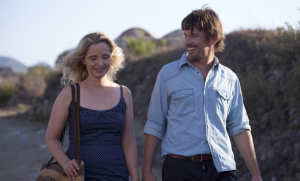In The 40-Year-Old Critic, Venganza Media creator and host Arnie Carvalho recalls a memorable film for each year of his life. This series appears daily on the Venganza Media Gazette.
I described yesterday my fear of watching This Is 40 — fear of a movie that may make me examine my own life in uncomfortable ways. I never expected the film I really should have been nervous of was one I raced to opening weekend; Richard Linklater’s Before Midnight, the third film in his Before series.
I first saw Before Sunrise in the mid-90s. I had discovered indie director Linklater with his mainstream 1993 hit Dazed and Confused. I considered that film to be the American Graffiti for Generation X. Both films were period pieces that spoke as much to the trials of teens in the present day as they did in the times in which they were set. Both films also focused on the period rock to help advance the story and the mood. After Dazed, Linklater became a director I wanted to follow.
More than just the director, I was also drawn to Sunrise by its male lead, Ethan Hawke, an actor I enjoyed seeing in Dead Poets Society and, more recently at the time of Sunrise‘s release, Reality Bites.
Finally, the genre seemed up my alley — the romantic comedy. From the trailers Sunrise seemed like another Reality Bites or Singles — Jesse (Hawke) was an American 20-something traveling through Europe. On a train ride he meets Céline (Julie Delpy), a blonde French beauty. The two have one night together in Vienna before Jesse returns to the United States.
When I saw the film I was surprised that it was far more of a romance film than a comedy, but also a tender and moving one. Few films made me feel I was watching an honest romance. Hawke and Delpy sold their attraction and affection for each other. Though they had only one night together, the two had laughs, arguments, and an honest connection. They fell in love with each other, and I fell in love with their relationship.
It was a great film, but not one I ever expected to have a sequel. It simply wasn’t the genre of film that spawned sequels. I would revisit Before Sunrise regularly in the 90s but never expected to see the characters again. I knew that Delpy, Hawke, and Linklater always teased the thought of returning to Jesse and Céline, but I just didn’t believe it would happen. As such I was utterly stunned in 2003 when I read the trio was reteaming for Before Sunset. This time the film was written by Linklater as well as Hawke and Delphy — the actors were helping shape the story of their characters. That was a major change from the original and showed that the director and stars were creating something truly unique and special.
Before Sunset told of Jesse and Céline meeting up again for the first time in 9 years. I was excited to see the film; I felt like Linklater was giving me a mini-college reunion — my own chance to catch up with two people I fondly remembered from the 90s.
When the film came out in limited release I was concerned it wouldn’t open in Springfield. As such Marjorie and I drove 8 hours round trip to see the movie in Chicago; it meant that much to me (ironically it opened in our town about two months later). I really enjoyed the sequel, though it had a totally different vibe than the original. Now in their 30s, the two have followed different paths; Jesse is married with a son, adding a complication and moral complexity to the prospect of a rekindled romance. Like most reunions, it was good to see these friends again, but we had grown apart a bit, and I didn’t feel as strongly about them as I did in the 90s.
But the door had been opened, and when Before Sunset came out Linklater, Delpy, and Hawke said they may return to these characters every nine years and check in on them. I wouldn’t have been shocked if a third film never came, but I equally wasn’t surprised when the third film, Before Midnight, was announced.
Now it was time for the cinematic equivalent of my 20th college reunion — it was time to see Céline and Jesse again. I was a bit concerned. Trailers let me know that the two characters had been together for the past nine years. While Linklater was a director I trusted, it seemed like a totally different concept than the previous two films. It felt like we had captured the characters’ every moment together on film, but in the years between Before Sunset and Before Midnight Jesse had left his wife and moved to Europe to be with Céline; they were now married and had twin girls. Could the film carry the same emotional resonance now that we were getting a “day in the life” type of story instead of seeing their only encounter?
My concerns were secondary, though; I saw Linklater, Hawke, and Delpy again teamed to find these characters’ stories, and so Before Midnight was my only must-see film in 2013 that wasn’t reviewed for Now Playing Podcast (though we came really close; I championed it, Stuart also wanted to, but it didn’t fit the schedule). This time there was no question Before Midnight would play in Springfield, and Marjorie and I went opening weekend. I sat down and watched the best film I would see all year.
Before Midnight never feels rushed. Though Linklater needs to catch us up on the nine years of history between our characters, the movie starts with a long scene of Jesse and Hank, his son from his previous marriage. After spending time with Céline and Jesse in Greece he was returning home to his mother. Jesse’s desire to be a good father is at odds with his current marriage — he’d like to move back to the states and be closer to his son.
When we again meet Céline and their twin daughters Ella and Nina we see a happy family, at least on the surface. With Jesse back, the four are taking a road trip for a weekend vacation at a house in the country. On the way the strains start to show as Céline starts discussing her dislike for her career and desire to change jobs though it would greatly impact their family.
But once we reach the country house and are introduced to Jesse and Céline’s various friends the theme of this movie became clear: it’s an exploration of ideas about love, sex, and commitment. Long conversations are had with middle-aged Céline and Jesse seeing new passion kindled between a twenty-something couple, and an older couple discussing their many years together. These stories tell of love at different stages, but also provide interesting debate on what it means to be in love, and to be committed. Céline and Jesse are committed it seems, and in love we hope, but they now want different things in their lives. In the grand spectrum of life, where does love fall on the priority list? What compromises must be made in order to work the logistics of staying together both emotionally and geographically?
As with the film’s view of love, the movie also changes as time passes. Céline and Jesse are given a romantic night at a hotel; their hosts will watch the girls. Now the film is back on familiar footing, with Jesse and Céline visiting a European locale and having meaningful conversations. Yet the stage has been set, and this time they must address their lives and their next steps.
It doesn’t go well. As couples do, new arguments lead to the trudging up of old dirt; Jesse had an affair while on a book tour, but it was just sex, not love. Meanwhile it’s strongly suggested Céline also cheated, rekindling an old romance. The fight grows bitter, raw, and real. It ends with Julie leaving the hotel room and her husband, saying she doesn’t love him anymore.
The film is dark and brooding. This was the film that I had feared This Is 40 would be; a hard look at middle-age and differing views of marriage and love. More, it is well-balanced. Both characters have made selfish choices and transgressions. Neither character is fully right, nor fully wrong, and, as accusations are made in the midst of a bitter fight, it’s hard to tell even what is fact and what is unsubstantiated accusation. It’s likely due to both lead actors participating in the script that this delicate balance is achieved. Neither character is the “bad guy” — nor is either good. Both are operating from their own points of view, and now they’re realizing their viewpoints don’t match up as they once thought.
This film hit incredibly close to home. Marjorie and I had been together for 13 years, married 11. Those years have been full of happiness, but all lives have hardships and all couples have spats. Watching Jesse and Céline break down in Europe when they realize they each had different ideas of marriage made me reflect. First, Marjorie and I were planning a romantic European vacation just weeks after watching this film — Before Midnight certainly seemed like a cautionary tale to not pick that time to discuss major life-changing decisions.
Marjorie found herself identifying with Céline; not just for the gender but also because Marjorie had a job and employer that made her miserable. Like Céline, Marjorie was looking for a career change, and that type of major decision can have a ripple effect. It did so happen that she interviewed for a new job the day before we flew to Europe, and while it didn’t diminish the fun of our vacation one iota, the question of career choices was discussed often on the trip.
I found myself identifying with Jesse. Sure, he’d made some poor decisions, but he was trying to balance his career with his desire to be a good husband and father. While I have no children, I completely identified with his being pulled in multiple directions. I also saw in Jesse my own artistic nature, but one not as accomplished as I’d like due to compromises and other priorities. I completely felt what Jesse was going through and empathized with him.
Yet what the movie really exposes is that two people can be together and have totally different views of their relationship. While happy and playful on the surface, beneath there could be unknown angst and tension. And it’s not that both parties are sublimating — it’s completely possible one person is miserable while the other is content.
The film led to some great conversations with my wife, ensuring we were indeed on the same page with our lives and not a tangled mess of miscommunication like Jesse and Céline. It was very interesting leaving the theater and cautiously discussing the themes; especially when we each took different sides in the argument. It didn’t, but it could have easily led to an argument between us, and that is how real Before Midnight feels.
In private I continued to ruminate on this film and the ideas it put forth. What is love? How does it change over time? These aren’t just academic discussions; these are the emotions that rule our lives. I love that Linklater, Hawke, and Delpy don’t give definitive answers; they raise viewpoints and it’s up to each individual member of the audience to supply the answers that are true for them.
This film is not the tearing down of what Before Sunrise and Before Sunset — its end message seems to indicate love conquers all, and it seems Céline and Jesse are in love after all.
As am I with my wife. As I write this we are on another romantic getaway for my 40th birthday. And, no, there have not been any fights, no storming out, no near-divorce moments.
But Before Midnight is one of the greatest types of films, one that hits home emotionally. I don’t know if Linklater, Delpy, and Hawke will reteam again in 2022. If they do, I don’t know if Célene and Jesse will still be married, or a divorced couple meeting again. What I know is I’ll be there to see what these characters say about people in the next stage of their lives, and I wonder how it will mirror my own.
Arnie is a movie critic for Now Playing Podcast, a book reviewer for the Books & Nachos podcast, and co-host of the collecting podcasts Star Wars Action News and Marvelicious Toys. You can follow him on Twitter @thearniec





Outstanding work Arnie! Like you, I’ve been a fan of this trilogy since “Sunrise” was released. I commend you for having the courage to see this with your wife- I would rather watch an orgy scene in Game of Thrones with my parents than experience the last 40 minutes of this film with my mine. (We have watched the previous 2 together- she was ambivalent about them so it wasn’t difficult to convince her to pass on it.)
That said, Lanklater, Hawke and Delpy made a masterful trilogy and are probably responsible, at least in part, for the “mumblecore” movement that came to be in the mid 2000’s. Directors like Joe Swanberg,Aaron Katz, et. al., seem to have been heavily influenced by the “Before” films.
I have enjoyed The 40 Year Old Critic series tremendously and this review, in particular, really resonated.
Wishing you a happy birthday and many more years of enjoying (and reviewing) great films.
Best regards,
Scott Berland
your best review by far. I have rarely been so inspired to watch a move from reading the review before. I have noticed that Now Playing seems to stay away from romances and comedies. I cant think of any that you have reviewed. It is too bad because you have seem to have some good things to say about them.